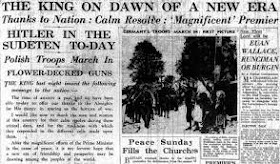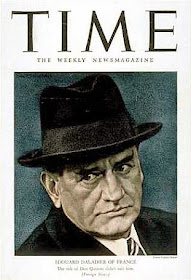Read any school textbook. See any history documentary on the Second World War. Ask anybody. The message will be the same. The war happened because Britain and France had weak leaders. Chamberlain and Daladier of France were too eager to placate Hitler and gave him anything he wanted.
The truth is far from that. Chamberlain and Daladier were no weaklings, no cowards who were afraid of Hitler. Munich happened because these two leaders had their own compulsions.
In short, these two men were caught in a time where there were no easy options. They did their best under the circumstances. History has not been kind and fair to these men.
Let us go back and try to see matters objectively.
"Again and again Canning lays it down that you should never menace unless you are in a position to carry out your threats."Neville Chamberlain, September 1938
In war, whichever side may call itself the victor, there are no winners, but all are losers.Neville Chamberlain
NEVILLE CHAMBERLAIN AND BRITAIN
If the Empire was a source of British strength, it was also the source of fundamental weakness. By the 1930s it was a structure almost impossible to defend adequately, even if Britain had enjoyed sufficient resources to attempt it. Britain, however, simply lacked the economic strength and military capacity to hold the Empire together in the face of serious threat. It was Chamberlain’s private view that ‘We are a rich and a very vulnerable empire and there are plenty of poor adventurers not very far away who look upon us with hungry eyes.’ This was a much more realistic assessment.
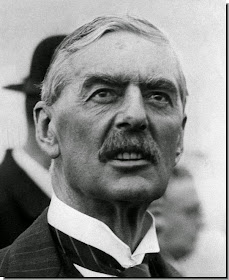 |
| Neville Chamberlain: A man wronged? |
------------------------------------
Appeasement is not always wrong. All concessions among enemies cannot be mistaken, or else politics would consist of little more than fighting
---------------------------------------------------------------
A stable world system was the only hope for the Empire’s survival. ‘We all agree – we want peace,’ wrote a Chief of Staff in the 1930s, ‘not only because we are a satisfied and therefore naturally a peaceful people; but because it is in our imperial interests, having, an exceedingly vulnerable empire, not to go to war.’
British power before 1914 rested on British economic strength: financial stability at home, and a stable trading and investing environment abroad. War damaged British economic interests more than those of other powers because Britain lived on exports and overseas investment. The Great War damaged British trade abroad irretrievably; the cost of the war reduced British investments overseas by two–thirds, and threatened the stability of the home economy through inflation and war debts. Though some measure of stability was restored in the 1920s, the British economy never recovered the special position it had once enjoyed. British trade in 1921 was less than half the level of 1913; cotton exports, the core of British pre–war trade, also fell by over half during the 1920s. Unemployment was well over a million for most of the decade and the government was saddled with a National Debt sixteen times greater in 1920 than it had been in 1910. A foreign policy of peaceful co–operation was essential to safeguard trade and to rebuild the foreign investment on which British economic influence had been based.
----------------------------------------
Britain’s small army was too weak to go to war in 1938; Britain needed time to re-arm.
-------------------------------------------------
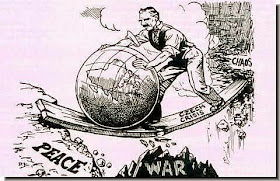 |
| The cartoon shows Chamberlain tried hard to maintain peace in an increasingly unstable Europe |
Japan was a potential threat, but clearly not in the immediate future. Without financial security future defence programmes were put at risk. The rise of Hitler evoked a similar caution. It was appreciated that Germany was a revisionist power, but it was also evident that Hitler’s priority was economic recovery and reemployment, as it was in Britain. Britain’s financiers and industrialists hoped to profit from German recovery with increased opportunities for trade and investment. By 1937 more than 50 per cent of the international credit extended to Germany was British, double the level of 1933.
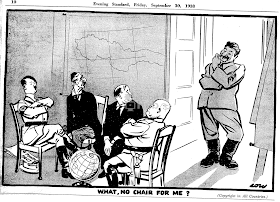 |
| If Britain and France had involved Russia, Hitler could have been contained |
The question that confronted British statesmen down to the outbreak of war in 1939 was quite simply how to regain the lost security of the Empire. The military’s answer was an obvious one: ‘So long as [the] position remains unresolved diplomatically, only very great military and financial strength can give the Empire security.’ British politicians knew this; but the answer was not straightforward at all. Financial strength could not be taken for granted. The economy was well on the way to recovery in 1936 but few politicians would have gambled with it.
----------------------------------
The Americans were determined to be isolationist. France did not want war. And Britain could not fight Germany alone.
------------------------------------------
VIDEO: CHAMBERLAIN RETURNS AFTER MUNICH
VIDEO: CHAMBERLAIN RETURNS AFTER MUNICH
The British approach to Germany was essentially pragmatic. It was not evident, as it was soon to become, that German ambitions were entirely open–ended and violent. But British leaders were not naive. The search for political solutions went hand in hand with a firm decision in 1934 to reverse the long decline in British military strength and to embark on an extensive rearmament. In November 1933 the Cabinet set up the Defence Requirements Committee to report on the long–term shape of Britain’s defence effort. Though the sums of money proposed were trimmed back by an anxious Treasury, it was agreed to expand the navy, build a secure naval base at Singapore, and pour more resources into the RAF, with particular attention to air defences to meet the threat of the bomber. The army had to take third place, as it had throughout the 1920s.
-------------------------------
Britain could not defend her empire AND fight a war in Europe.
--------------------------------------
It is easily forgotten that Chamberlain, man of peace that he was, did not exclude the possibility of war. ‘Armed conflict between nations is a nightmare to me,’ he told radio listeners late in 1938, ‘but if I were convinced that any nation had made up its mind to dominate the world by fear of its force, I should feel that it must be resisted.’
High levels of government spending on arms produced rising costs and the prospect of inflation, and serious shortages of skilled labour. There was never a point at which high levels of military spending would not have distorted and damaged the economy. Churchill’s view that the German threat could be met only by very high levels of current military expenditure ignored the constraints of industrial capacity, manpower and financial security, and underestimated the potential for a much more effective war effort three or four years hence. Large fleets of biplanes and light bombers in 1938 would have been unlikely to deter Hitler, or for that matter Japan and Italy, and would have sacrificed the resources needed for the new weapons in the pipeline. The British rearmament effort from its nature needed not money but time.
----------------------------------
Appeasement was justified by the interaction between the factors of a poorly equipped military that had to provide a global defence for all of Britain's territories, an anti-war mindset among the population, and economic circumstances that pointed to the avoidance of a large-scale conflict.
-------------------------------------------
The government recognized that it would be some time before Britain was secure from such a threat. The programmes would be complete or near completion in 1939 and 1940. Against this background Chamberlain embarked on his active efforts to settle the grievances of Europe.
There were few defenders of the Czech state among British leaders. It was regarded as a ‘highly artificial’ creation, whose integrity was not a vital British interest. It was not an issue, remarked Alexander Cadogan, head of the Foreign Office, ‘on which we would be on very strong ground for plunging Europe into war’. Nor could the Czechs be given serious military help. The Germans, it was thought, would overrun them ‘in less than a week’
----------------------------------
Although contemporaries and scholars during and after the war criticized Chamberlain for believing that Hitler could be appeased, recent research argues that Chamberlain was not so naive and that appeasement was a shrewd policy developed to buy time for an ill-prepared Britain to rearm.
------------------------------------------
If Germany invaded Czechoslovakia and France went to her aid, Britain would be obliged to help France. This was an obligation not of morality, but of necessity. German defeat of France would tilt the European balance so overwhelmingly against Britain that it could not be contemplated. Yet even with France the military prospects in 1938 looked far from satisfactory. There would be no point in fighting Germany, Chamberlain argued, ‘unless we had a reasonable prospect of being able to beat her to her knees in a reasonable time and of that I see no sign’. It was the central purpose of British strategy during the months of crisis in 1938 to avoid a European war before British rearmament was completed. The object was not so much to appease Hitler as to restrain France.
Even Chamberlain’s critics saw the sense of preserving peace in 1938. Eden acknowledged that ‘Munich has given us time at least’; Roosevelt telegraphed the simple words ‘Good man’.
----------------------------
It meant that, when war eventually came, Britain had the morale advantage. If Britain had gone to war over the Rhineland, most of the population would have been opposed to war, because most people in Britain at that time agreed with Hitler that the Treaty if Versailles WAS unfair in this respect. Britain could never have won the Second World War with doubt on the home front. Appeasement meant that, when Chamberlain did eventually declare war, the British people went to war knowing that they had done everything in their power AND MORE to keep the peace. And that knowledge helped to keep them going through six years of total war.
------------------------------------
The villain is a different Chamberlain, one of the ‘Guilty Men’ who failed to stand up to fascism in 1938 and fight; who put the self–interest of Britain’s ruling classes before good sense and morality. A ‘British Tory’, as Roosevelt privately sneered, ‘who wants peace at a great price’. Yet it is difficult to see what room for manoeuvre Chamberlain really had in 1938. The list of factors cautioning peace was a formidable one. Chamberlain was protecting not just Britain but the British Empire. The simultaneous threat from Italy and Japan loomed larger rather than smaller as the Czech crisis worsened. Chamberlain had been premier for only a year; he was understand– ably not prepared to crown that period by deliberately courting a war that all his military advisers warned him would destroy the Empire. In 1938 the rearmament programme was only halfway to its goal and was facing major problems. Until it was complete Britain had almost nothing with which to threaten Hitler, except what General Pownall called ‘our poor little army’. The RAF plans to bomb Germany proved on closer inspection in 1938 to be completely worthless. Though British military intelligence rightly observed that Germany was far less formidable than the public image suggested, the element of risk was enormous. Most terrible of all was the threat of the ‘knock–out blow’ from Germany’s bomber force.
What was more important was the knowledge Chamberlain had that within twelve months Britain’s military position would be quite different.
All the Dominions except New Zealand were hostile to the idea of fighting for Czechoslovakia. On 1 September the Prime Ministers of both Australia and South Africa confirmed that they would not become involved on Britain’s side. On the 24th the four High Commissioners in London of New Zealand, South Africa, Canada and Australia announced that ‘the German proposals can’t be allowed to be a casus belli’,’" and they continued to press this view up to the 28th, the day that Hertzog, the South African premier, got unanimous parliamentary approval for a declaration of neutrality. The fear of Empire disunity was an important one to Chamberlain, as it would have been for any British prime minister. ‘There would be no point in fighting a war that would break the British Empire,’ explained Britain’s charge d’affaires in Washington, ‘while trying to secure the safety of the United Kingdom.’
Chamberlain saw the British options plainly: ‘Hoping for the best, but preparing for the worst’.
--------------------------
In the 1930s, Britain was in the middle of the greatest economic depression ever known. The policy of appeasement was the only policy Britain could afford.
-------------------------------
In October Chamberlain explained that ‘it would be madness for the country to stop rearming … We should relax no particle of effort.’ Chamberlain had been a re-armer before Munich; he remained one thereafter.
Chamberlain sought to capitalize on the temporary advantage won at Munich, but he had few illusions left about Hitler. According to one official, whenever Hitler’s name was mentioned, Chamberlain ‘made a face like a child being forced to swallow castor oil’.
Appeasement, he confessed, was not a ‘very happy term’ nor one that accurately described his wider purpose, which was to ensure ‘that no Power should seek to obtain a general domination of Europe’. But now Germany was a threat to British liberty. This Chamberlain announced, ‘we will never surrender’. If the threat of domination should come Britain would resist it ‘to the utmost of its power’.
‘Hitler wants to dominate Europe,’ Chamberlain told the French Foreign Minister on 21 March. ‘We shall not permit it.’
Chamberlain’s repeated fear that ‘the burden of armaments might break our backs’ was realizing itself under the pressure of emergency. The balance of payments crisis grew deeper as Britain sucked in the extra imports for defence. British gold reserves fell to half the level of 1938 as capital flowed away from London in search of safer havens. The first signs of inflation were evident. The Chancellor of the Exchequer became more insistent as the year went on that Britain faced imminent financial collapse. ‘We shall find ourselves in a position’, he told the Cabinet in May, ‘when we should be unable to wage any war other than a brief one.
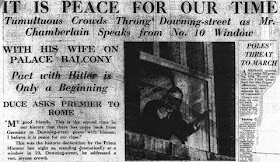 |
| There was wide-spread support for Chamberlain on Munich Agreement |
By late August the Dominions had moved from strong support for appeasement to staunch support for war. Commonwealth unity was, according to Chamberlain, ‘all important’. The Dominions, like Britain, began after Prague to see the real dangers posed by the Axis powers. In April 1939 the new Australian Prime Minister, Robert Menzies, let it be known that ‘If Britain was at war, Australia was too.’ New Zealand was drawn closely into British defence planning during 1939 and gave Chamberlain unqualified support during August. In Canada the premier, Mackenzie King, had preached appeasement since the Imperial Conference of 1937 but had changed his mind by January 1939. Gradually in the late summer of 1939 the nationalist revival in Britain and France began to affect Canada’s two populations and an evident enthusiasm to defend democracy against fascism and aggression replaced a widespread isolationism. The exception was South Africa. Even here Britain’s old Boer enemy, Jan Smuts, was able to blunt the isolationism of the Afrikaner nationalists sufficiently to bring South Africa into war by a narrow parliamentary majority.
The final ultimatum and declaration of war had to be co–ordinated with France, which wanted a forty–eight–hour delay to permit evacuation and initial mobilization to take place. On 2nd September Ciano proposed a conference of all the major powers; Chamberlain and Halifax could only accept it on the complete withdrawal of all German troops from Poland, something which both they, and Ciano, knew to be impossible. But the problems with both France and Italy led to an unfortunate delay in sending the final ultimatum, and aroused suspicion in Parliament that Chamberlain was seeking to avoid war. By the evening of 2 September the French would still not agree to co–ordinate an early ultimatum.
Reference: Johndclare.net
DALADIER AND FRANCE
If the blood of France and of Germany flows again, as it did twenty-five years ago, in a longer and even more murderous war, each of the two peoples will fight with confidence in its own victory, but the most certain victors will be the forces of destruction and barbarism.
Eduoard Daladier
Even while the 1919 settlement was being drafted, French leaders knew that the problem of Germany would never disappear, though its potential for damage could be limited. ‘Mark well what I’m telling you,’ said Georges Clemenceau, France’s great war leader and her representative at the Peace Conference in Paris, ‘in six months, in a year, five years, ten years, when they like, as they like, the Boches will again invade us.’ With a prophetic accuracy France’s other great war leader, the supreme Allied commander, Marshal Foch, warned his countrymen: ‘This is not a peace: it is an Armistice for twenty years.’ Throughout those twenty years French politicians and soldiers tried to come to terms with this stark reality: the peace could not be permanently enforced, and Germany, slowly, but apparently inexorably, regained her former vigour.
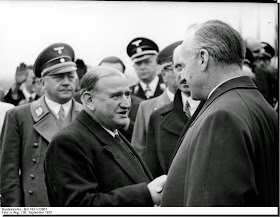 |
| Daladier in 1938: A brave man fighting off the vultures |
The First World War had weakened rather than strengthened France. During the slaughter of the Great War, France lost one–quarter of all her men aged between eighteen and twenty– seven, a higher proportion than any other nation. Four million Frenchmen carried the wounds of that conflict. The war destroyed the enduring value of the French franc, unchanged since Napoleon’s time. By 1920 it was worth only a fifth of its pre–war value, while France was saddled with enormous debts from the war and a bill for war pensions, which twenty years later still consumed over half of all government expenditure. To make matters worse France had lost more than half her overseas investments during the war, including the investments in tsarist Russia which had provided an income of sorts for over two million French rentiers. By the end of the war France owed 30 billion francs to Britain and the United States. Finally there was the devastation wrought by the warring armies along France’s eastern territories, which in the end the French themselves paid more to repair than the Germans. By 1924 the French economy was deep in crisis, rescued in the end only by a timely devaluation of the franc and a brief export revival, before being plunged once again into crisis in the 1930s.
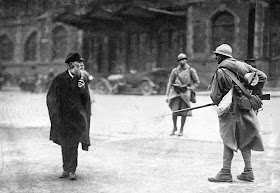 |
| The French occupation of Ruhr in 1923 was a mistake |
In 1923 French soldiers were sent into Germany to occupy and secure the Ruhr, Germany’s industrial heartland, from where supplies of German coal could be sent back to France. The occupation aroused the fury of her erstwhile allies, while the Germans pursued a policy of passive resistance.
By 1926 the last French troops left the Ruhr. But the damage was done. The effort to make Germany pay harmed France’s reputation internationally and alienated Britain and the United States, the very powers that had helped to draw up the settlement in 1919.
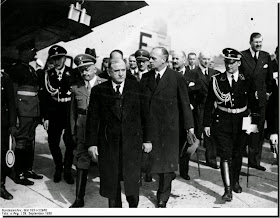 |
| An unhappy Daladier arrives at Munich on September 29, 1938 for the summit |
The effect of the economic collapse was not felt immediately in France, for her economy was less dependent on trade and industry, while a healthy balance of payments had stored up large quantities of gold in the Bank of France, producing the financial equivalent of the Line. But if France was sheltered from the worst of the economic blizzard, her allies in Eastern Europe were enfeebled by it, and Germany brought close to bankruptcy. French bankers bore some of the responsibility for this; so too did French politicians who refused to budge on the question of reparations until 1932, when it was clear even to them that Germany simply could not pay. French financial strength protected the small French producer and rentier, but internationally it backfired. By helping to fuel the economic crisis in Germany, the French produced what they feared most, a political crisis that brought to power at last a radical, revisionist government in Berlin.
French self–interest during the depression alienated Britain and the United States as well. Few tears were shed abroad when the French economy in turn began to go into steep decline in 1932, at just the point that the shattered economies of the other powers were beginning to revive. The paradox of French decline and international recovery can partly be explained by just this lack of goodwill. The pound and the dollar were both devalued to save British and American exports. The French government hesitated to follow suit for fear of destroying confidence in the future of the French economy, and from fear of alienating the thousands of small French investors through renewed inflation. Instead French exports remained in the doldrums for most of the 1930s.
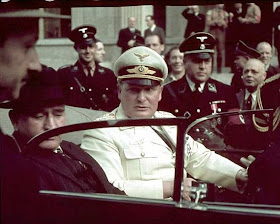 |
| Daladier looks dejected as he rides with Goering |
By 1934 France found her overseas trade cut by almost half from the level of 1928. Tariffs kept out cheaper foreign goods, but contributed to the prevailing spirit of protectionism and self interest. But the decline of the French economy owed as much to conditions within France. The government remained committed to the ideals of Adam Smith or even Malthus: not only did the state reject the recovery strategies of the American New Deal or the German ‘New Plan’, with their strong dirigiste elements and proto–Keynesianism, but it deliberately restricted out– put and cut government expenditure, to match supply to demand. The result was financial suicide: as demand fell, tax receipts from the inefficient French revenue system fell sharply, much faster than government expenditure. As a result governments that were wedded to monetary orthodoxy found themselves facing a wider and wider budget deficit. Each deficit produced a further frantic round of cuts in wages and services. By 1935 French industrial production was one–third lower than in 1928 and barely recovered for the rest of the decade. The situation in the French countryside was even worse.
Agricultural prices fell by 50 per cent, until the price of wheat reached its lowest point since the French Revolution. The sharp fall in peasant income, in a country with a backward agrarian system, spelt serious crisis. France relied on rural demand to keep afloat the millions of small businesses, the cafes, craft workshops and stores scattered throughout provincial France. When the peasant pulled in his belt, so did the artisan and shopkeeper. Much of France was potentially self–sufficient. Economic crisis produced the same effect as international crisis. The French peasant and producer pulled into their shells; conservative and defensive, they retreated into prepared positions and sat there. The political consequences of economic crisis were profound.
VIDEO: DALADIER RETURNS AFTER MUNICH
The Third Republic had experienced slow but almost continuous economic growth since its inception in 1870. When that growth was at last reversed in the 1930s the crisis exposed deep social and political divisions in France. Some of the rifts were old ones revived by economic failure – the division between town and countryside, between labourer and patron, between the secular, liberal urban bourgeoisie and the nationalist, clerical elite. In the past these con– flicts had been resolved within the framework of the conservative republican state. In the 1930s the old conflicts were expressed in a different language altogether. The economic crisis brought new forces into French political life, anti–parliamentary, radical, dangerous: on the left the Communist Party, on the right, a whole spectrum of fascist and quasi–fascist movements. Willy–nilly French domestic politics came to reflect the wider international conflict between right and left.
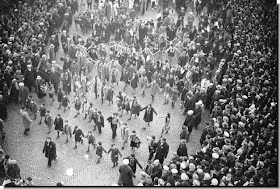 |
| Political turmoil in France in 1936. A Popular Front demonstration in Paris |
The German reoccupation of the Rhineland, Hitler’s response to the Franco–Soviet Pact, was a dramatic challenge to France, a gauntlet flung in the face of Versailles. When the news broke on the streets of Paris in the late morning of 7 March there was consternation, talk of mobilization, even talk of war. In the Chamber Georges Mandel, the radical disciple of Georges Clemenceau, echoed his one–time mentor in calling for France to mobilize and drive the Germans from the Rhineland. But in the end France did very little and history has judged her harshly for it. Yet the circumstances could hardly have been less propitious. France was deep in political crisis, ruled by a caretaker government in the run–up to parliamentary elections. The French generals, victims of government cutbacks, advised caution. The French public mood was against war and for peace. Abroad, France feared isolation. Britain refused to act over the Rhineland, relations with Italy were rapidly deteriorating over the Ethiopian affair. The last thing French leaders wanted was a repetition of the debacle in the Ruhr in 1923, when they were cast in the role of aggressor for trying to uphold the letter of the treaty.
When Hitler turned to Czechoslovakia in the spring of 1938, the French were at last called to account for that network of alliances made in the 1920s with the Versailles states. Though the French ambassador in Prague could assure the Czech President Benes in April that France ‘would always be faithful to her word’, the mood in Paris was much more pessimistic about saving her ally. It was by no means clear that France would be in a position to be both willing and capable of helping Czechoslovakia, certainly without British help. Daladier was prepared to fight Germany if the Czech state were actually invaded, but in practice made every effort to secure a settlement that would prevent German invasion. The Chief of Staff, Général Gamelin, had already declared in April that it was impossible to give effective military assistance to Czechoslovakia. When Daladier visited London on 27 April, it was already clear that neither Britain nor France was prepared to take the lead in the Czech problem for fear of being drawn into war by the other. By a process of elimination it was agreed that pressure should be put on the Czechs to make concessions.
This was not an honourable course, though it was an understandable one. Daladier faced throughout the crisis from April to September serious limitations on his freedom of action. Some of these were military in character. Gamelin spelt out early in 1938, in a memorandum reminiscent of British justifications for appeasement, the sheer range of strategic difficulties faced by France. The army was not yet trained for an offensive against Germany, nor was the Maginot Line either complete or manned.
French interests around the world were threatened, not merely in Eastern Europe. Nothing should be done to alienate Italy lest Mussolini should tear apart what Daladier called ‘the seam between the two zones’ of France’s empire. In the Far East the French empire was threatened by Japan without, and communist agitation within. These views were echoed by military leaders throughout the year. Général Requin, appointed to lead French forces against the Reich if war should come, mourn– fully contemplated ‘the death of a race’; and Général Vuillemin, head of the French air force, never veered from his assertion that his air force would be ‘wiped out in a few days’.
Though the threat of German air power was exaggerated, it had a powerful effect on French opinion at the time. Daladier was warned again and again that war with Germany in 1938 would mean the destruction of Paris through a cruel bombardment. The French intelligence service told Daladier on the very day of Munich that the Germans had 6,500 aircraft of the very latest type ready to fly (almost four times the true number). Guy La Chambre, Daladier’s Air Minister, told the American ambassador that ‘the safest place for the next two years in France would be a trench’.
The other limitations were domestic. French rearmament was renewed again in April 1938, with a big increase in the allocation to the air force, but slow progress was made because of shortages of skilled labour (exacerbated by the forty–hour week and la semaine de deux dimanches*) and shortages of raw materials and modern factory space. ‘Stagflation’ had taken its toll of French industrial efficiency and French trade. Rearmament with modern weapons had a high price. In 1938 France was already spending more than two and a half times what she had spent on the military in 1913. Daladier was as well aware as Chamberlain that appeasement would buy time to complete rearmament. But the other issue was public opinion. It was the view of the British ambassador in Paris that ‘All that is best in France is against war, almost at any cost.
Nevertheless Daladier, like Chamberlain’s colleagues, had limits to his wish for peace. On 25 September he finally refused to accept the timetable for German occupation demanded by Hitler at his meeting with Chamberlain at Bad Godesberg. If Germany attacked Czechoslovakia to extract its demands Daladier said that France ‘intended to go to war’. What had seemed at one time a sensible policy of concession by the Czechs now appeared as an international humiliation for France; on the following day Daladier told the US ambassador that he preferred war to humiliation. The French Cabinet was divided, but Daladier was not prepared to allow ‘the immediate entry of thirty German divisions … for this will mean war’. French military preparations began.
When Chamberlain secured Hitler’s agreement to a four–power conference at Munich. Daladier had no choice but to follow suit, since France could not contemplate confronting Hitler alone. The British had failed to give France firm support for fear of encouraging French bellicosity; but France needed that support to confront Hitler convincingly. Daladier had no stick with which to beat the British, and found himself, hostile, taciturn, unsmiling, sitting with Chamberlain to sign away the only genuinely democratic state in Eastern Europe.
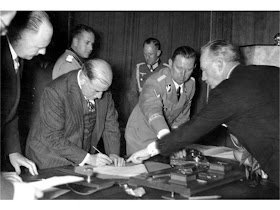 |
| An unhappy Daladier signs the Munich Agreement on September 30, 1938 |
The episode profoundly affected Daladier; the overwhelming desire to avoid its repetition recurred throughout the year that led to war.
When Daladier himself arrived back at Le Bourget airport he was astounded to find his way lined with ecstatic men and women rejoicing at peace. ‘The blind fools,’ was his bitter reaction.
Daladier’s options throughout the Czech crisis had been impossibly narrow. Munich was an outcome he would have done much to avoid if he could. The result was to leave France and French security in a worse position than ever. In two years French ascendancy had been utterly overturned. Her Eastern alliances were exposed as worthless; the Soviet Union was alienated by the sacrifice of Czecho– slovakia; Italy assumed a growing arrogance in her relations with France; and France herself was forced, much against Daladier’s will, to follow the British ‘governess’ without any real promise of reciprocal help if French security were threatened. France was now faced with an unenviable choice: either to accept German domination and to reach close ties with Hitler, or to put Munich behind her and accept the prospect of war. France, said Daladier, had to choose ‘between a slow decline or a renaissance through effort’.
Daladier himself was no warmonger, but he would not accommodate Hitler and he would no longer tolerate the politics of stalemate. He recognized clearly that to be strong abroad it was necessary to be strong at home. This meant facing the solutions of the Popular Front head on. The political alliance had already broken apart before Munich, but communist support for war in September made their isolation complete. Daladier attacked the communists, winning increasing support from the right as he did so and permitting the reformation of the traditional nationalist bloc. The attack on communism was completed by a frontal assault on the social achieve– ments of the Popular Front. The forty–hour week was already weakened before Munich; from October Daladier insisted that the forty–hour week would have to go. In November he took on the unions and the Communist Party. By a series of special decree laws, passed without reference to Parliament, public works were abandoned in favour of rearmament, taxation was sharply raised, civil servants were sacked to help balance the budget, and the forty–hour week was overturned and Saturday working resumed.
Fear of Germany and hatred of Italy produced a patriotic response that united Frenchmen who on other issues remained divided. The revival should not be exaggerated for there was still a great deal of confusion and demoralization in France in 1939 as well. Weil’s ‘anxiety’ continued to coexist with the nationalism. Peasants continued to cheer the defenders of Munich, so anxious were they to avoid the killing fields again. The prominent pro–German appeasers of the right argued their case right up to the outbreak of war and beyond. The conflict between collaborators and resisters was born long before Vichy. Yet for the moment French patriotism had supplanted political decadence. The ordinary Frenchman did not welcome war, but he welcomed Hitler less.
Daladier himself had the lowest opinion of the British ruling classes. He told the American ambassa– dor that he ‘fully expected to be betrayed by the British … he considered Chamberlain a dessicated [sic] stick; the King a moron; and the Queen an excessively ambitious woman … he felt that England had become so feeble and senile that the British would give away every possession of their friends rather than stand up to Germany and Italy.’
The strong fears the French had had about the Polish guarantee proved to be a real stumbling block with the Soviet Union. When military talks began with Soviet leaders in August 1939 the key issue rapidly became whether or not Poland would allow the passage of Soviet troops through Polish territory in her defence. The Poles were adamant that not a single Soviet soldier would be allowed on to Polish soil. Bonnet and Daladier made frantic efforts to force the Poles’ hand. The French could not understand the stubbornness of the Poles, for whom Soviet help seemed a lifeline. But on 19 August, at the height of the delicate negotiations with the Soviet Union, Beck, the Polish Foreign Minister, rejected Soviet help: ‘We have not got a military agreement with the USSR. We do not want to have one.’ Daladier telegraphed frantically to the head of the visiting mission in Moscow, General Doumenc, asking him to sign anything he could with the Russians. It was all to no avail; the Soviet Union had been secretly negotiating with Hitler’s Germany and had kept the talks with France going partly to pressure the Germans into making concessions. On 23 August the Nazi–Soviet Pact was agreed, and the idea of the Franco–British–Soviet bloc collapsed.
Daladier found himself facing in August 1939 the same dilemma he had faced a year earlier. Bonnet urged him to force the Poles to give Danzig to the Germans. Daladier hoped that at the last a reasonable settlement could be reached that would satisfy Germany but would not humble France. But he was determined that if Germany invaded Poland France would fight, Soviet help or not. He did not relish the conflict but France was in a much stronger position than a year before.
By September 1939 British and French aircraft output and tank output exceeded that of Germany. By May 1940 French monthly production alone was as great as German, rather over 600 aircraft per month. In addition France was being supplied with 170 aircraft a month by the United States. In terms of quality the new generation of French combat aircraft, the Dewoitine 520, the Morane–Saulnier 406 and the Bloch 152, were the equal of their German or British counterparts. By May 1940 4,360 modern aircraft had been produced. German strength before the battle of France was 3,270 aircraft of all types. In tank construction the French enjoyed both a qualitative and a quantitative advantage. By May 1940 the French had built 4,188 modern tanks with a gross weight of over 60,000 tons. The Germans had built 3,862 with a gross weight of 36,000 tons, though this figure included 1,400 of the light Mark I tank which was little more than an armoured car.
Much has been made of the failure of Britain and France to synchronize their declarations of war against Germany. Yet there is no mystery here. The French constitution required a formal vote of parliament before any ultimatum could be sent. The Chamber could not be recalled until 2 September at the earliest. Gamelin then insisted that the declaration of war should be postponed if possible for up to forty–eight hours to allow the crucial early stages of mobilization to take place without the threat of German bombing. Evacuation procedures could be carried out before a formal state of war existed. As the French ambassador in London, Charles Corbin, reminded the angry British callers at the Embassy that night, France had six million men to call to the colours. Mobilization meant a real upheaval in France, much more than in Britain. France had its ultimatum, which was sent at 10.20 on the morning of 3 September. War was declared at 5.00 p.m., six hours after Britain, whose ultimatum had been sent earlier to avoid a parliamentary revolt. In the evening Daladier announced the conflict to the nation: Germany ‘desires the destruction of Poland, so as to be able to dominate Europe and to enslave France. In rising against the most frightful of tyrannies, in honouring our word, we fight to defend our soil, our homes, our liberties.'
Suggested Reading
